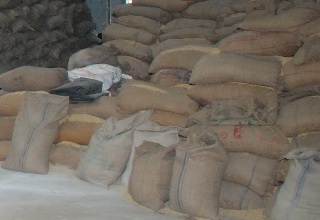Mandatory jute packaging of food grains & sugar; support to JCI get govt nod
Updated: Jan 29, 2015 12:05:52pm

Amidst many concerns that the reservation for jute packaging would be reduced, the move will preserve the position as in the past and help the jute sector, an official release said on Wednesday.
However, in order to preserve and promote this vital sector which generates a lot of livelihoods for farmers and workers, the CCEA has decided that the minimum percentage to be reserved for packaging in jute are – food grains (90 per cent of the production); and sugar (20 per cent of the production) for the Jute Year 2014-15.
There is however a condition: “With the stipulation that in the first instance, the indents for the whole requirement would be placed for the jute bags and in case the jute mills would not be able to provide the jute bags as per the requisition, then a dilution upto 10 per cent would be permissible by the Department of Food in consultation with the Ministry of Textiles,” it said.
In addition, certain exemptions are allowed in the Order under JPM Act: Sugar packed for export but which could not be exported may be exempted from the operation of the Order on the basis of an assessment by and request of the Department of Food and Public Distribution.
Further certain products are out of the purview of the reservation: sugar fortified with Vitamins; packaging for export of the commodities; small consumer packs of 10 kgs and below for food grains and 25 kgs and below for sugar; and bulk packaging of more than 100 kgs.
In case of any shortage or disruption in supply of jute packaging material or in other contingency/exigency, the Ministry of Textiles may, in consultation with the user Ministries concerned, relax these provisions further, up to a maximum of 30 per cent of the production of food grains over and above the extent mentioned.
In yet another decision, CCEA has approved providing financial support to the JCI.
“It has been decided to provide subsidy to Jute Corporation of India (JCI) on a continuous basis to off-set the losses on account of Minimum Support Price (MSP) operations by JCI. The quantum of subsidy will include the difference between the Purchase and Sale Price of MSP Raw Jute. The quantum of subsidy will also include fixed overhead costs incurred by JCI in maintaining its infrastructure for MSP operation,” an official release said on Wednesday.
The reimbursement of fixed overhead cost would be maintained albeit at a reducing amount.
The decision will provide financial support to Jute Corporation of India to protect the interest of the Jute Growers through procurement of Raw Jute under the MSP fixed by the Government of India and also to stabilize the raw jute market for the benefit of the 40 lakh farm families and the jute economy as a whole.
JCI is the Price Support Agency of the Government of India for jute to protect the interest of the Jute Growers through procurement of Raw Jute under the MSP fixed by the Government of India from time to time and also to stabilize the raw jute market for the benefit of the jute farmers and the jute economy as a whole.
To enable JCI to conduct MSP operation and be in preparedness for MSP at the start of every year, yearly grant is provided to the JCI to meet its operational expenditure and overheads for MSP preparedness. (KNN/ES)












